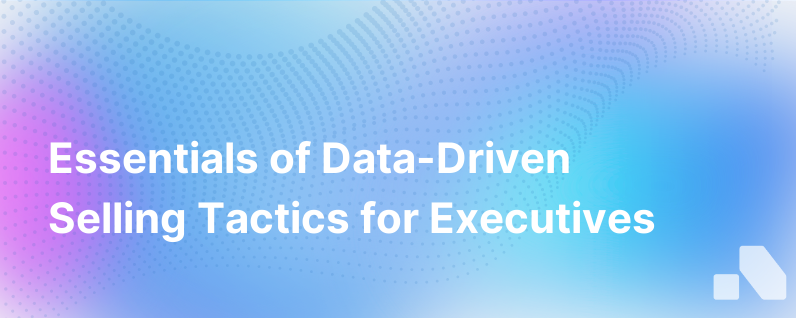Foundations Of Data Driven Selling Act
Published on October 30, 2023 by Sawyer Middeleer
Data-driven selling is not a new concept; however, it has never been as important as it is now in the complex B2B sales landscape. In a market that's perpetually changing—with new entrants and evolving customer needs—a data-driven approach can be the make-or-break for your sales team's success.
Moving beyond mere intuition and experience, data-driven selling revolves around leveraging data to inform sales strategies, make predictions, optimize processes, and ultimately, close more deals. Let’s explore the foundations necessary for an effective data-driven selling approach to equip your sales team and drive substantial growth.
Developing a Data-driven Sales Culture
The first step towards data-driven selling is to foster a culture that values data and analytics as essential tools. Cultivating this mindset across the organization ensures that from top-level executives to front-line sales reps, everyone appreciates the power of data and uses it to guide their decisions.
Embracing a data-driven culture involves:
- Training sales teams on data literacy and analytical thinking.
- Encouraging transparency and sharing of data insights across departments.
- Recognizing and rewarding decisions and strategies that are backed by data.
Integrating High-Quality Data Resources
In order to act based on data, collecting accurate and relevant data is quintessential. Clean, organized, and comprehensive data lays the foundation for useful insights. There are several layers to data integration for a sales team:
- Implement robust CRM systems to capture customer interactions and sales activities.
- Utilize external databases for market intelligence and leads.
- Set up marketing automation platforms that feed data back into your sales databases.
- Ensure that data is timely and continuously refreshed to reflect the most current conditions.
Establishing Key Metrics and Analytics
With a wealth of data at your fingertips, the challenge becomes deciphering which metrics matter most to your sales processes. Identifying and monitoring key performance indicators (KPIs) can provide your team with actionable insights. Among these valuable metrics are:
- Sales funnel conversion rates highlight potential blockages in the sales process.
- Average deal size and time to close help gauge efficiency and identify strategies that work.
- Customer acquisition cost (CAC) and customer lifetime value (CLTV) measure the return on investment of your selling activities.
Crafting a Data-Driven Sales Process
Designing a sales process that is not only informed by data but also constantly improved through ongoing analysis is vital. A data-driven sales process might include:
- Structuring outreach based on lead scoring models that predict the likelihood of conversion.
- Using past performance data to set realistic and challenging sales targets.
- Applying data from customer feedback and support tickets to refine product pitches and sales collateral.
Leveraging Predictive Analytics
One of the most transformative elements of data-driven selling is the use of predictive analytics. By analyzing existing data to make informed predictions about future customer behaviors, sales teams can:
- Prioritize leads more effectively based on their predicted conversion likelihood and potential value.
- Forecast sales trends and adapt strategies proactively, rather than reacting to market changes.
- Personalize sales interactions based on predictive models of customer preferences and needs.
Continuous Refinement Through A/B Testing
To truly excel at data-driven selling, sales strategies should constantly be tested and optimized. A/B testing allows sales teams to experiment with different approaches and determine what works best using empirical data. Key considerations include:
- Setting clear hypotheses and success metrics for each test.
- Ensuring that tests are run on a statistically significant sample size.
- Integrating learnings from A/B tests into the standard sales practices.
Building Data-Driven Sales Skills
Enabling your sales force with data-savvy skills isn't an overnight task but an ongoing commitment. Sales reps must be comfortable interpreting data insights and translating them into action.
Training programs to develop these skills could cover areas like data visualization interpretation, using analytics tools within CRM software, and understanding statistical principles to avoid common data fallacies.
Leveraging Technology and Automation
Technology plays an integral role in actualizing a data-driven sales strategy. Automation tools can take care of routine tasks such as data entry, reporting, and email sequences, allowing sales reps to focus on strategy and customer relationships.
Moreover, AI-powered sales platforms like Aomni can provide real-time insights, automate data analysis, and generate actionable recommendations, which can be a huge asset.
Ethical Considerations and Data Compliance
With the growing emphasis on data utilization comes the responsibility of staying compliant with data privacy laws and maintaining ethical standards. This means:
- Ensuring all customer data is obtained with consent and used transparently.
- Observing regulations such as GDPR, CCPA, and others concerning customer data.
- Incorporating data security measures to safeguard against breaches and unauthorized access.
Embracing Adaptivity and Learning
Finally, a cornerstone of data-driven selling is being open to learning and adapting based on what the data tells you. This adaptivity requires:
- Evaluating sales tactics and pivoting strategy when data suggests poor performance.
- Using data success stories to foster continual growth and curiosity among the sales team.
- Remaining flexible, as market conditions can change and require a different data interpretation.
In Conclusion
Data-driven selling is not futuristic; it is the current marker of sophisticated and successful B2B sales teams. It transcends gut feelings with actionable insights, providing sales teams with the direction and evidence they need to strategize effectively and win more business.
While the journey toward a truly data-driven sales organization isn’t necessarily simple, the benefits of increased efficiency, sales effectiveness, and ultimately, revenue, make it well worth the effort. With tools like Aomni facilitating real-time analytics and insights, sales teams are now equipped more than ever to embrace data-driven selling as a fundamental practice in their organizations.